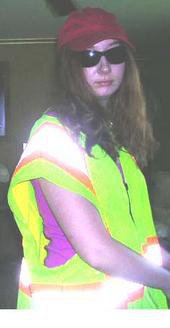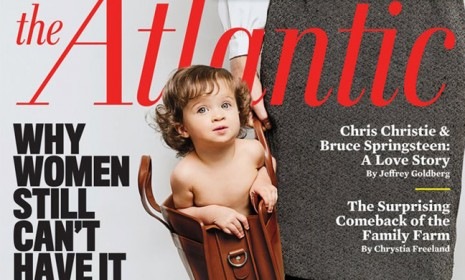Every day I walked into work at the county highway department, I hoped that day would be less awkward than the last, and not only because all of my co-workers were men. I have to admit that as I looked at the avid Rush Limbaugh listeners and Harley Davidson bikers, who proudly stuck their guts out as they leaned against the station walls, I thought: I have nothing in common with these guys.
So it’s fair to assume they made the same judgment about me. When I started my first day of work, the foreman said to me in disbelief, “So you’re…going to work here?” before telling me to leave my black alligator purse in the truck.
The men I worked with said and did all sorts of sexist things while I was there. Many of the men bonded over nude pictures and posted some of them on their dashboards. Some of them yelled at the young men for swearing while a “lady” was present. They laughed at me for offering to do “men’s work.” One of them asked way too many personal questions and tried to pressure me into dating an older co-worker.
The list goes on.
But some of them also told me to speak up if I felt uncomfortable and apologized for the lack of female employees. Though some of them wouldn’t let me do certain jobs, others offered to teach me how to maintain the roads. And in their own flawed way, they tried to correct sexism by making hand signals whenever they saw an “attractive” male.
Sometimes I miss those days. I knew how they perceived my gender and how it affected their actions at work. It wasn’t okay but it was out there and I could acknowledge it if I wished.
The men I’ve worked with professionally since then have been different. They were the men I always thought I could identify with; the men I trusted to treat me as an equal because they read the same publications, aligned with similar politics and received the same level of education.
As I participated in other male dominated worlds, politics and journalism (yes, a ton of women are entering but the editors are mostly men), the sexism is more covert but it is still there. And unlike the highway workers, many of them aren’t addressing it or even attempting to correct it.
This issue came to my attention after listening to the comments and advice given by journalism professors, internship coordinators, guest speakers, editors and fellow journalists over the past few years.
Guest speakers tell a group of co-ed, students, mostly female, that women just aren’t as good at interviewing. He presented this as an inconvenient truth. The professor looked embarrassed but not too embarrassed to acknowledge the statement, brushing it off later with the comment, “He’s a little old school.”
Conversely, people who work for state government tell a group of female student journalists that we’ll get along in this business because we’re pretty. We’ll be great at the interview!
It’s worse than just a few men who haven’t caught up with the rest of the pack. There are liberal thought leaders, both of the vaunted and hot dog variety, who perpetuate sexism every day.
Michael Moore defended Julian Assange after he was charged with rape and sexual molestation and coercion. Chris Matthews piled on Hillary Clinton in 2008, calling her “anti-male” and “uppity.” Liberal television hosts, Keith Olbermann and Ed Schultz love to insult women they disagree with using gendered language, calling them sluts, bimbos and in Olbermann’s case, “a mashed up bag of meat with lipstick.”
There are less inflammatory but still hurtful comments made by journalists and opinion writers from revered institutions. Sometimes it isn’t what these sources say, but what they don’t say, or how they frame arguments on gender that make a difference.
When a journalist has been hired by The New York Times, you don’t expect liberalism but you do expect fairness. However, one reporter found time to comment on an 11-year old rape victim’s clothing, and lead his story with a quote sympathizing with the several men charged with raping her.
The Atlantic, which boasts great writers and a groundbreaking history, chooses to talk about feminism by reducing the conversation to pictures of babies in suitcases and hyperbolic phrases like the “End of Men” and “Having It All.”
Sometimes it’s more important to take a long, studied look at your own weedy backyard instead of scoffing at the redneck neighbors who leave their rusted swing-set and broken down Chevy in the front yard. The most insidious form of bigotry is usually found inside the people you consider most enlightened, including yourself. Dig up your own weeds first, because if the people who are best positioned to acknowledge sexism don’t see it in themselves, we can’t fix it, period.


